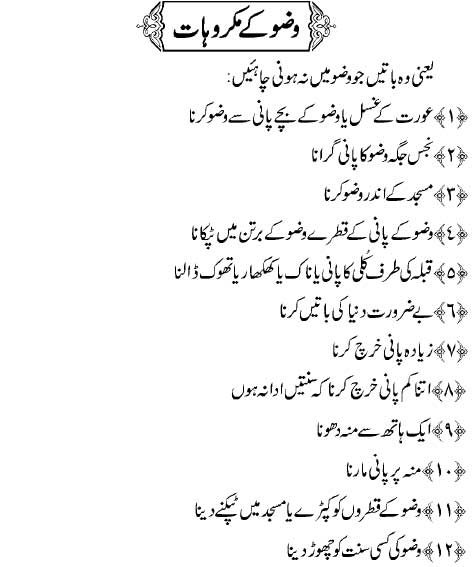
The Sin Of Letting The Prayer Lapse
The Holy Prophet has said: “Whoever lets the Prayer lapse, and then offers it after its due time, will burn in hell for not praying on time, for a period of one “Haqab”.”
One “Haqab” equals 80 years, and one year has 360 days, and the Day of Resurrection will equal a thousand years. This means that one who lets just one Prayer lapse will burn in hell for a period of 28,800,000 years !! (May Allah protect us – A’ameen).
Allamah Amjad Ali Aazmi (may Allah have mercy on him) mentions that abandoning Prayer is terrible in itself, but see what Allah, the Supreme, says about those who let it lapse: “So ‘vail’ (or ruin) is to those offerers of Prayer – Those who are neglectful of their Prayer.” (Surah Maoon)
‘Vail’ is the name of a dreadful valley in hell, from which hell also seeks refuge. This will be the destination of those who let their Prayers lapse. (Bahaare Shariat)
Shaitan Ki Insano Say Adawat Aur Dushmani
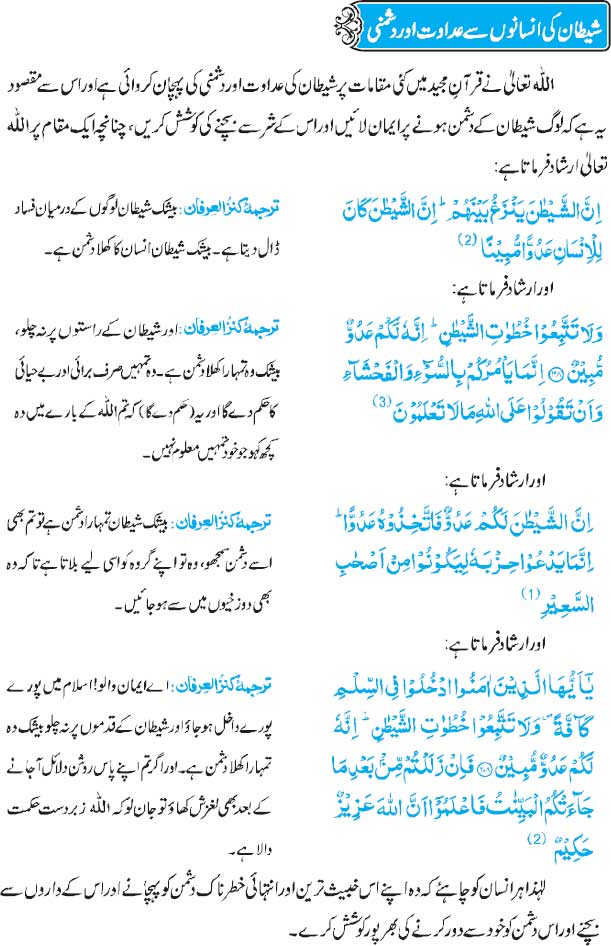
The Importance Of Prayer (SALAAT)
The importance of establishing Prayer has been mentioned in the Holy Quran and Hadith, on several occasions:
Allah the Supreme states in the Holy Quran: “And keep the Prayer established, and pay the charity, and bow your heads with those who bow (in Prayer).”(Surah Baqarah)
On another occasion, it is stated: “Guard all your Prayers and the middle Prayer; and stand with reverence before Allah.” (Surah Baqarah)
On yet another occasion, it is stated: “And keep the Prayer established at the two ends of the day and in some parts of the night.” (Surah Hud)
The “two ends of the day” mean the morning and evening. The time before noon is classified as morning and the time after it is classified as evening. The Morning Prayer is the Dawn (Fajr) prayer, and the Prayers of the evening are the Afternoon (Zohr) and the Evening (Asr) Prayers. The Prayers for the night are the Sunset (Maghrib) and the Night (Isha) Prayers. (Tafseer Khazain ul Irfan)
The Holy Quran classifies Prayer as an act that is opposite to the habits of polytheists. It states, “Inclining towards Him – and fear Him, and keep the Prayer established, and never be of the polytheists.” (Surah Ruum)
In other words, not offering the Prayer is to be like the polytheists. This is further confirmed by the words of the Holy Prophet “The entity that lies between a bondman and disbelief, is the abandonment of Prayer.” (Saheeh Muslim)
The Holy Quran warns those who abandon Prayer, in the following words: “And after them came the unworthy successors who squandered Prayer and pursued their own desires, so they will soon encounter the forest of Gai in hell.” (Surah Maryam)
‘Gai’ is a well in the lowest part of hell, which accumulates the pus of its inhabitants. It is also mentioned that ‘Gai’ is the hottest and deepest part of hell. This is the well that Allah opens up whenever the heat of hell lessens, causing the fire of hell to rage again. This well is the destination of those who abandon Prayer and adulterers, drunkards, usurers, and those who hurt their parents.
The Holy Quran has mentioned a trait of the hypocrites, that they are lazy in offering Prayers, and that they deem it to be a burden. It, therefore, states: “Undoubtedly the hypocrites, in their fancy, seek to deceive Allah whereas He will extinguish them while making them oblivious; and when they stand up for Prayer, they do it unwillingly and for others to see, and they do not remember Allah except a little.”(Surah Nisaa)
The Holy Prophet has said the following about the hypocrites: “The most burdensome prayers for the hypocrites are the Night Prayer and the Dawn Prayer. If they were to know the blessings they have in store, they would have come to them, even slithering.” (Saheeh Bukhari and Saheeh Muslim)
The Holy Quran also explains that offering the Prayer is not at all a burden for those who believe in Allah and the Last Day. It says: “And seek help in patience and prayer; and truly it is hard except for those who prostrate before Me with sincerity – Who know that they have to meet their Lord and that it is to Him they are to return.” (Surah Baqarah)
We, therefore, know from the Holy Quran, and from the Hadith, that it is obligatory for all Muslims to offer Prayers 5 times daily. To be lazy in Prayer, and especially not to offer the Night and Dawn Prayers, are the traits of hypocrites. We also know that not offering Prayer is the way of the disbelievers – this is why the Sahabah (the Companions of the Holy Prophet) did not deem the abandonment of any deed as disbelief, except the abandonment of Prayer.
The importance of Prayer can be gauged from the fact that it has been emphasized right from childhood. The Holy Prophet has said:”Command your children to pray when they become seven years old, and beat them for it (Prayer) when they become ten years old; and arrange their beds (to sleep) separately.
Khulfa-e-Rashideen
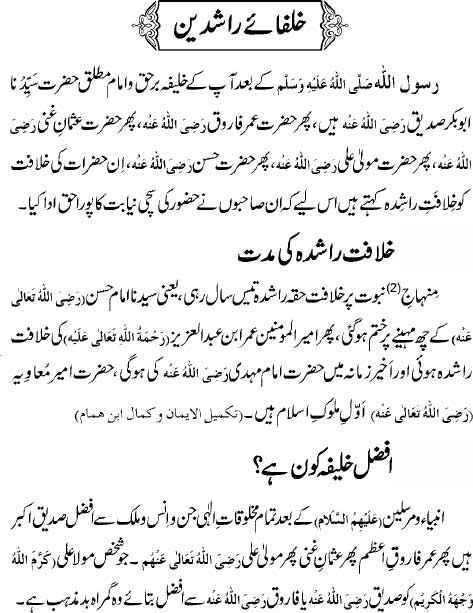
What Is Prayer (Salaat)
The Prayer is:
- The coolness of the eyes of the Holy Prophet Mohammed
- A pillar of religion
- The key to paradise
- The spiritual ascent of the faithful believer
- The greater Jihad (holy war)
- A sign of faith
- Light of the heart
- The radiance of the face
- The nourishment of the soul
- A cause of blessings in the house
- A cause of abundance in the provision
- Cure for ailments of the body and soul
- A light in the gloom of the grave
- A canopy in the hot sun on the Day of Resurrection
- An entertainer of the heart amidst the fear of the grave
- A swift carrier across the thin bridge on the Day of Resurrection
- A means of attaining forgiveness from sins
- A barrier between hell and the offerer of Prayers
- A repeller of the devil
- A bestower of Allah’s proximity and His favor
After proper acceptance of faith and its inherent beliefs, i.e. the recitation of the Pure Words (Kalemah Tayyebah), the most important duty is that of offering the Prayer.
The Holy Prophet has stated: “The first duty that Allah, the Supreme, has ordained upon my nation is that of offering Prayer, and indeed Prayer is the first thing that will be taken account of on the Day of Resurrection.”
It is also reported in the Hadith that, “Whoever keeps the Prayer established, has kept his religion established – and whoever leaves Prayer has demolished religion”.
It is reported by Syedna Abu Hurairah (may Allah be well pleased with him) that the Holy Prophet said: “Allah the Supreme states, ‘O the son of Adam! Free yourself for My worship, I shall fill your heart with content – and if you do not do so, I shall make you busy in several affairs but not remove your poverty.’ ” (Mishkaat ul Masabeeh, Ibn Majah)
“Be content with five things before (the advent of) the other five: Youth before old age, good health before sickness, prosperity before poverty, a spare time before indulgence in affairs, and life before death.” (Hadith reported in Tirmizi)
Regrettably, the Muslims of this age have forgotten Prayer. Most people do not have the time for it, whereas some people do offer their Prayers but do not know the proper way of offering them. It is imperative to learn the correct way of offering the Prayer and to offer all the 5 Obligatory Prayers with the congregation.
This concise book attempts to highlight the importance, excellence, mode, and rules of Prayer from the Holy Quran, Hadith, books of Hanafi Jurisprudence, Fatawa Razvia and Bahaare Shariat. May Allah grant all Muslims the guidance to seek religious knowledge and to act upon it – A’ameen (and through the supplications of the Holy Prophet ).
Wazu Toarnay Wali Cheezain
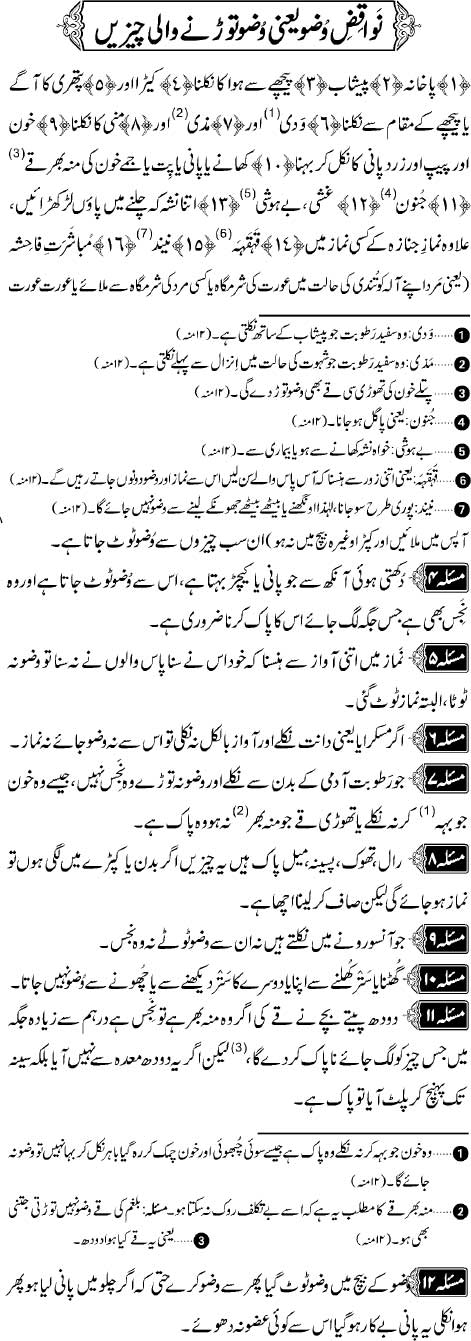
Guide People To Right Path
{Invite (mankind, O Muhammad ) to the Way of your Lord (i.e. Islam) with wisdom (i.e. with the Divine Inspiration and the Qur’an) and fair preaching, and argue with them in a way that is better. Truly, your Lord knows best who has gone astray from His Path, and He is the Best Aware of those who are guided.}
(Holy Quran-16:125)
{And who is better in speech than he who [says: “My Lord is Allah (believes in His Oneness),” and then stands straight (acts upon His Order), and] invites (men) to Allah’s (Islamic Monotheism), and does righteous deeds, and says: “I am one of the Muslims.”} (Holy Quran-41:33)
The prophet (peace and blessings of Allah be upon him) said: “By Allah if Allah guides one person by you, it is better for you than the best types of camels.” [al-Bukhaaree, Muslim]
The prophet (peace and blessings of Allah be upon him) also said, “Whoever calls to guidance will have a reward similar to the reward of the one who follows him, without the reward of either of them being lessened at all.”
[Muslim, Ahmad, Aboo Daawood, an-Nasaa’ee, at-Tirmidhee, Ibn Maajah]
Allah Ki Raza Kay Liay Aik Doosray Say Mohabbat Rakhnay Kay Fazail
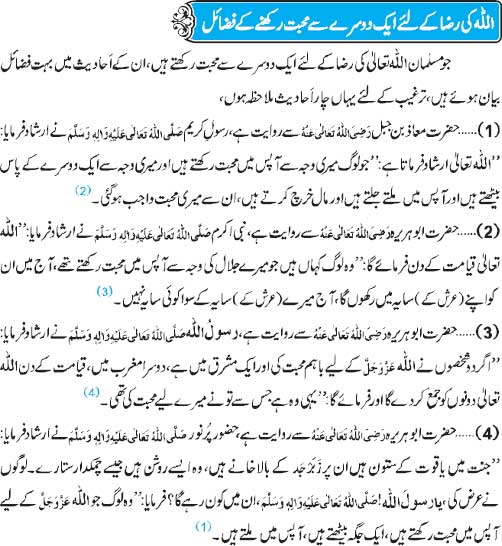
When A ChildIs Born, Make Aqiqah
The ahaadeeth about the prescription of the ‘Aqiqah’ are many. From them is that which al-Bukhari reports: that Allah’s Messenger (peace be upon him) said: “With the child, there is ‘Aqiqah’, so spill blood for him and remove the harm from him”.
And from them is the hadeeth of Samurah who said: Allah’s Messenger (peace be upon him) said: “Every child is in pledge (raheenah) for its ‘Aqiqah’ which is sacrificed for it on its seventh day, and it is named on it, and its head is shaved.”
1. When a boy or girl is born, it is preferable to name the child and make Aqiqah on the seventh day. By making Aqiqah, the child is safeguarded from all types of dangers and calamities.
2. The method of Aqiqah is that if a boy is born, two goats or two sheep should be slaughtered. If a girl is born, one goat or one sheep should be slaughtered. Alternatively, if one wishes to take a share in a bull that is being slaughtered for Qurbani, then two shares should be taken for a boy and one share for a girl. Furthermore, the child’s head should be shaved, the hair should be weighed, and gold or silver equal to the weight of the hair should be given to charity. If one wishes, saffron could be applied to the child’s head.
3. If one does not make the Aqiqah on the seventh day, one should bear in mind the seventh day (when making the Aqiqah in the future). The method of calculating the seventh day is that the day that the child is born, Aqiqah should be made the following week but one day before that. For example, if the child is born on a Friday, Aqiqah should be made on the following Thursday. If the child was born on a Thursday, Aqiqah should be made on the following Wednesday.
4. The custom of slaughtering the animal at the exact time when the barber places his shaving machine on the child’s head is nothing but a useless custom. According to Shariah, it is permissible to slaughter the animal either before shaving the head or after. It is not good to insist on following customs that have no basis in the Shariah.
5. The animal that cannot be used for Qurbani cannot be used for Aqiqah as well. If an animal is permissible for Qurbani, it will be permissible for Aqiqah as well.
6. The meat of Aqiqah could be distributed raw or cooked, or it could be prepared as a meal and people could be invited to join in the meal.
7. It is permissible for the parents, grandparents, etc. to consume the meat of Aqiqah.
8. A person does not have sufficient wealth. He, therefore, makes Aqiqah of only one animal on behalf of his son. There is no harm in doing so. If a person does not make Aqiqah at all, there is no harm in this as well.

